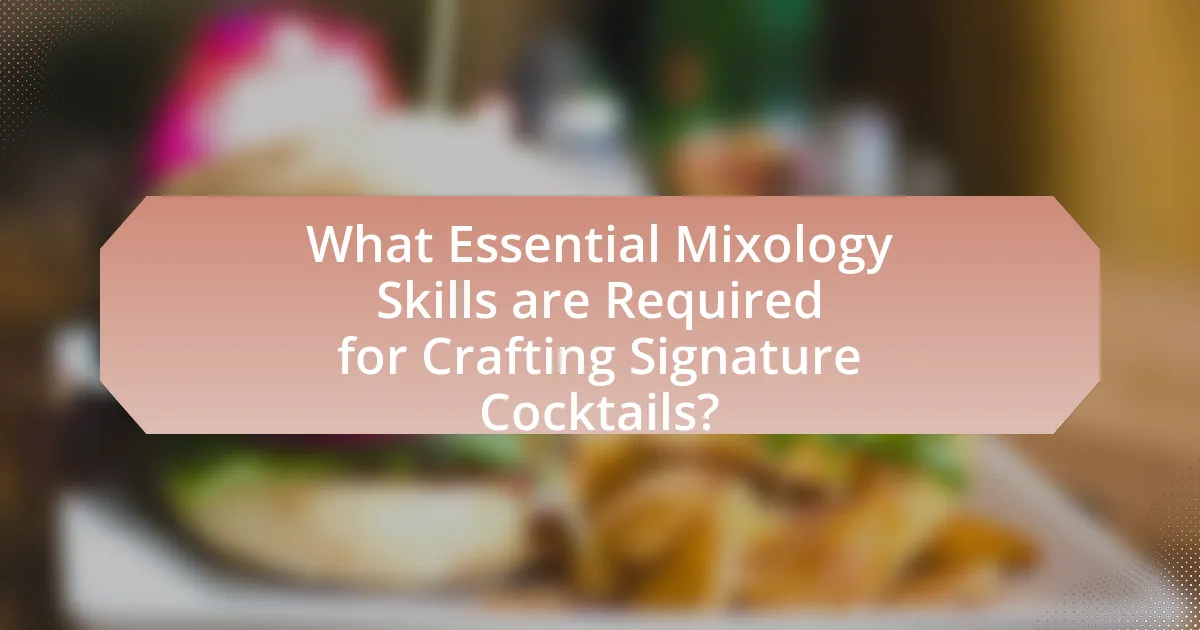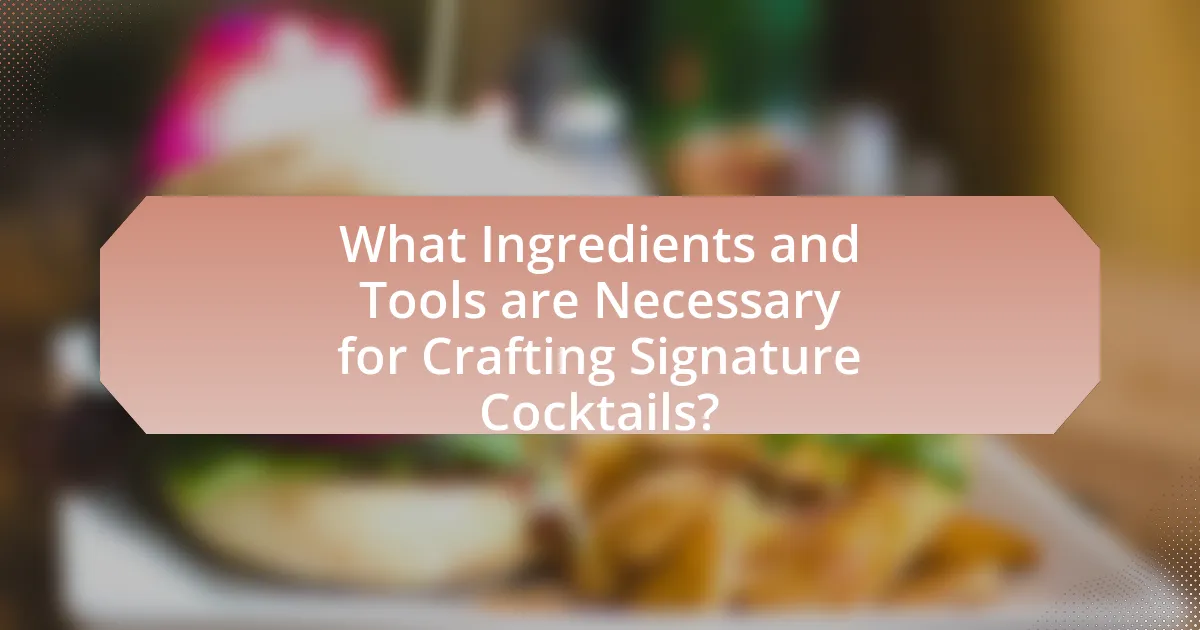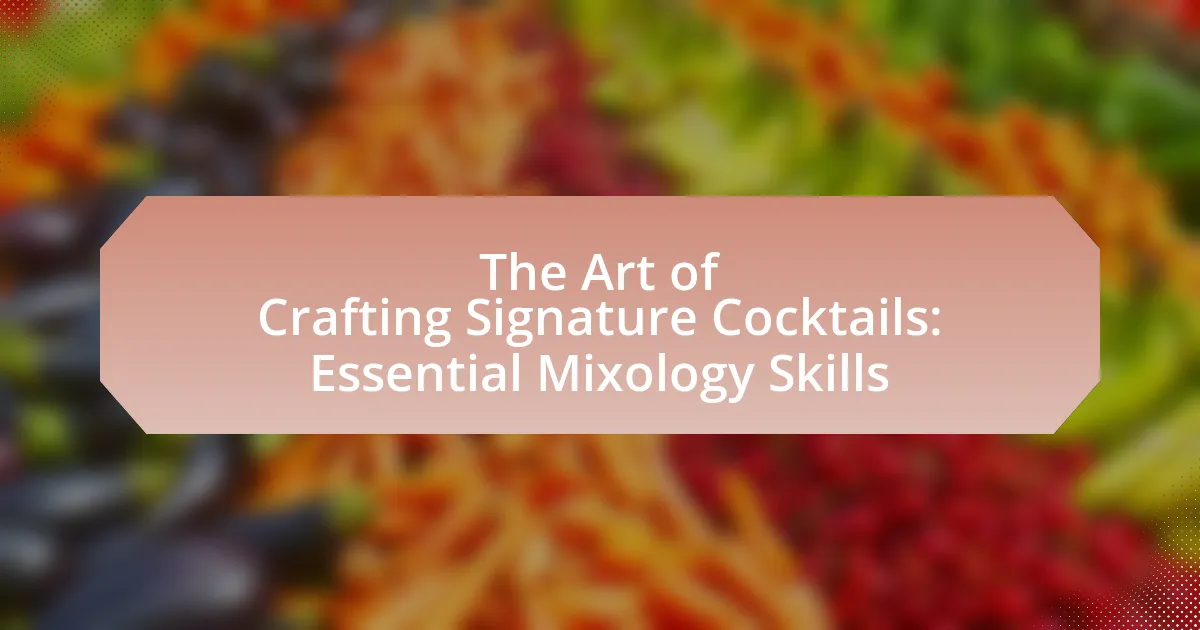The main entity of the article is the art of crafting signature cocktails, emphasizing essential mixology skills. The article explores the significance of signature cocktails in enhancing brand identity, customer engagement, and overall experience in the bar industry. It differentiates signature cocktails from regular cocktails through their uniqueness and personalization, outlines the foundational skills required for mixologists, and discusses the impact of ingredients, tools, and presentation on cocktail creation. Additionally, it highlights best practices for achieving consistency and perfecting recipes over time, providing a comprehensive overview of the mixology craft.

What are Signature Cocktails and Why are They Important?
Signature cocktails are unique drink creations that represent a specific brand, event, or individual, often crafted to reflect personal tastes or themes. They are important because they enhance the overall experience of an occasion, create a memorable identity for events, and can showcase the creativity and skill of the mixologist. Signature cocktails can also drive customer engagement and loyalty, as patrons often associate specific drinks with particular venues or experiences, thereby increasing repeat business.
How do Signature Cocktails differ from regular cocktails?
Signature cocktails differ from regular cocktails primarily in their uniqueness and personalization. Signature cocktails are often created to reflect a specific theme, event, or the personality of the host or establishment, incorporating distinctive ingredients or presentation styles that set them apart. For example, a bar may have a signature cocktail that features locally sourced ingredients or a unique flavor profile that is not found in standard cocktail recipes. This customization enhances the drinking experience and creates a memorable association with the event or venue, making signature cocktails a key element in the art of mixology.
What defines a cocktail as ‘signature’?
A cocktail is defined as ‘signature’ when it is uniquely crafted to represent a specific bar, bartender, or occasion, often featuring distinctive ingredients or preparation methods that set it apart from standard cocktails. Signature cocktails typically reflect the personality or style of the creator, incorporating local flavors or innovative techniques that enhance the drinking experience. For instance, many renowned bars create signature cocktails that are exclusive to their menu, showcasing their creativity and expertise in mixology.
Why are Signature Cocktails significant in mixology?
Signature cocktails are significant in mixology because they represent a unique blend of creativity, personal branding, and customer engagement. These cocktails allow mixologists to showcase their skills and innovation, often incorporating distinctive ingredients or techniques that reflect their style or the establishment’s theme. For instance, signature cocktails can enhance a bar’s identity, making it memorable and appealing to patrons, which is supported by the fact that establishments with unique offerings often see increased customer loyalty and repeat business.
What role do Signature Cocktails play in the bar industry?
Signature cocktails serve as a key differentiator in the bar industry, enhancing brand identity and customer experience. They allow establishments to showcase creativity and expertise, attracting patrons seeking unique drinking experiences. According to a study by the National Restaurant Association, 70% of consumers are more likely to visit a bar that offers distinctive cocktails, highlighting their importance in driving customer engagement and loyalty. Additionally, signature cocktails can increase profitability, as they often have higher markups compared to standard drinks, contributing to overall revenue growth for bars.
How can Signature Cocktails enhance a bar’s reputation?
Signature cocktails can enhance a bar’s reputation by creating a unique identity that distinguishes it from competitors. When a bar offers exclusive, well-crafted drinks, it attracts customers seeking a distinctive experience, leading to increased word-of-mouth referrals and social media buzz. For instance, a study by the National Restaurant Association found that 70% of consumers are more likely to visit a bar that offers unique cocktails. This differentiation not only fosters customer loyalty but also positions the bar as a trendsetter in the local nightlife scene, ultimately enhancing its overall reputation.
What impact do Signature Cocktails have on customer experience?
Signature cocktails significantly enhance customer experience by providing a unique and memorable element to dining or social events. These specially crafted drinks often reflect the establishment’s brand identity and creativity, making customers feel more engaged and valued. Research indicates that 70% of consumers are more likely to return to a venue that offers distinctive drink options, as these cocktails create a sense of exclusivity and personalization. Additionally, signature cocktails can stimulate conversation and social interaction among patrons, further enriching the overall experience.

What Essential Mixology Skills are Required for Crafting Signature Cocktails?
Essential mixology skills required for crafting signature cocktails include flavor pairing, technique proficiency, and presentation skills. Flavor pairing involves understanding how different ingredients interact, allowing for the creation of balanced and innovative drinks. Technique proficiency encompasses mastering various methods such as shaking, stirring, muddling, and layering, which are crucial for achieving the desired texture and taste. Presentation skills are vital for enhancing the visual appeal of cocktails, as studies show that aesthetics significantly influence taste perception. Together, these skills enable mixologists to create unique and memorable signature cocktails.
What foundational skills should every mixologist possess?
Every mixologist should possess foundational skills in flavor pairing, cocktail preparation techniques, and customer service. Flavor pairing involves understanding how different ingredients interact to create balanced and enjoyable drinks, which is essential for crafting unique cocktails. Mastery of cocktail preparation techniques, such as shaking, stirring, and muddling, ensures that drinks are made correctly and consistently. Additionally, strong customer service skills are crucial, as they enhance the overall experience for patrons and foster a welcoming atmosphere. These skills are supported by industry standards and training programs that emphasize the importance of both technical and interpersonal abilities in successful mixology.
How does understanding flavor profiles contribute to mixology?
Understanding flavor profiles is crucial in mixology as it enables bartenders to create balanced and harmonious cocktails. By recognizing the characteristics of various ingredients—such as sweetness, bitterness, acidity, and umami—mixologists can effectively combine flavors to enhance the overall drinking experience. For instance, a study published in the Journal of Food Science highlights that cocktails with complementary flavor profiles are more appealing to consumers, leading to increased satisfaction and repeat orders. This knowledge allows mixologists to innovate and tailor drinks to specific tastes, ensuring that each cocktail resonates with the intended audience.
What techniques are essential for mixing and serving cocktails?
Essential techniques for mixing and serving cocktails include shaking, stirring, muddling, layering, and garnishing. Shaking is used to combine ingredients thoroughly and chill the drink, typically done with a cocktail shaker. Stirring is employed for drinks that require gentle mixing, ensuring clarity and maintaining texture. Muddling involves crushing ingredients, like herbs or fruits, to release their flavors, which is crucial for cocktails like mojitos. Layering is a technique that creates visually appealing drinks by carefully pouring liquids of different densities. Finally, garnishing enhances the presentation and aroma, often using fruits, herbs, or spices. These techniques are foundational in mixology, ensuring balanced flavors and an appealing presentation.
How can creativity be harnessed in cocktail crafting?
Creativity can be harnessed in cocktail crafting by experimenting with unique flavor combinations, presentation styles, and innovative techniques. Mixologists can draw inspiration from diverse culinary traditions, seasonal ingredients, and even cultural themes to create signature cocktails that stand out. For instance, utilizing herbs, spices, and unexpected fruits can lead to distinctive flavor profiles, while techniques like molecular gastronomy can enhance the visual and sensory experience of the drink. Historical examples, such as the use of bitters in classic cocktails, demonstrate how creativity has evolved in mixology, leading to the development of new styles and trends.
What methods can be used to develop unique cocktail recipes?
To develop unique cocktail recipes, mixologists can employ methods such as ingredient experimentation, flavor pairing, and seasonal sourcing. Ingredient experimentation involves trying various spirits, mixers, and garnishes to discover new combinations. Flavor pairing utilizes the principles of complementary and contrasting flavors, often guided by established culinary practices, to create balanced drinks. Seasonal sourcing encourages the use of fresh, local ingredients, which can inspire creativity and enhance the cocktail’s appeal. These methods are supported by the growing trend in mixology that emphasizes innovation and personalization, as seen in the rise of craft cocktail bars that prioritize unique offerings.
How does presentation influence the perception of a cocktail?
Presentation significantly influences the perception of a cocktail by affecting the drinker’s expectations and enjoyment. A visually appealing cocktail can enhance the perceived quality and flavor, as studies show that aesthetics can alter taste perception; for instance, a study published in the journal “Food Quality and Preference” found that participants rated the taste of drinks higher when they were presented in an attractive manner. Additionally, the use of garnishes, glassware, and color can evoke specific emotions and associations, further shaping the overall experience. Thus, the way a cocktail is presented plays a crucial role in how it is perceived and enjoyed.

What Ingredients and Tools are Necessary for Crafting Signature Cocktails?
To craft signature cocktails, essential ingredients include spirits (such as vodka, gin, rum, tequila, and whiskey), mixers (like tonic water, soda, and fruit juices), fresh herbs, fruits, and bitters. Necessary tools comprise a cocktail shaker, jigger for measuring, muddler for crushing ingredients, strainer for pouring, and a bar spoon for stirring. These components are fundamental as they allow for the creation of diverse flavors and textures, enabling mixologists to develop unique and personalized drinks.
What are the key ingredients for creating diverse cocktails?
The key ingredients for creating diverse cocktails include spirits, mixers, flavoring agents, garnishes, and ice. Spirits form the base of cocktails, with options like vodka, gin, rum, tequila, and whiskey providing distinct flavor profiles. Mixers, such as tonic water, soda, or fruit juices, enhance the drink’s taste and balance the alcohol. Flavoring agents, including bitters, syrups, and fresh herbs, add complexity and depth to cocktails. Garnishes, like citrus peels, cherries, or herbs, not only enhance visual appeal but also contribute to aroma and flavor. Lastly, ice is essential for chilling and diluting cocktails, affecting the overall drinking experience. These components work together to create a wide range of flavors and styles in cocktail crafting.
How do different spirits affect the flavor of a cocktail?
Different spirits significantly influence the flavor profile of a cocktail by contributing unique characteristics such as sweetness, bitterness, and aromatic qualities. For instance, vodka provides a neutral base that allows other ingredients to shine, while gin adds herbal and botanical notes due to its juniper content. Rum introduces sweetness and tropical flavors, particularly in light rums, whereas whiskey imparts rich, smoky, or spicy undertones depending on its type and aging process. Each spirit’s distinct flavor compounds interact with mixers and garnishes, creating a complex and layered taste experience in cocktails.
What role do mixers and garnishes play in cocktail creation?
Mixers and garnishes are essential components in cocktail creation, as they enhance flavor, balance, and presentation. Mixers, such as juices, sodas, and syrups, dilute the alcohol and introduce complementary flavors, making the drink more palatable. For example, tonic water adds bitterness that balances the sweetness of certain spirits. Garnishes, including fruits, herbs, and spices, not only add visual appeal but also contribute aromatic elements that elevate the overall drinking experience. A study published in the Journal of Food Science indicates that the sensory attributes of cocktails, including aroma and taste, are significantly influenced by the choice of mixers and garnishes, underscoring their critical role in mixology.
What tools are essential for a well-equipped bar?
Essential tools for a well-equipped bar include a cocktail shaker, jigger, bar spoon, muddler, strainer, and a variety of glassware. These tools facilitate the precise mixing, measuring, and serving of cocktails, which is crucial for achieving consistent quality in drink preparation. For instance, a cocktail shaker allows for effective mixing of ingredients, while a jigger ensures accurate measurement of spirits, which is vital for maintaining the intended flavor profile of cocktails. The use of these tools is standard in professional bartending, as they enhance efficiency and improve the overall cocktail experience.
How do specific tools enhance the cocktail-making process?
Specific tools enhance the cocktail-making process by providing precision, efficiency, and consistency in drink preparation. For instance, jiggers allow bartenders to measure ingredients accurately, ensuring balanced flavors in cocktails. Shakers facilitate proper mixing and chilling, which is crucial for achieving the desired texture and temperature. Additionally, strainers help in removing solid ingredients, resulting in a smooth final product. The use of these tools not only improves the quality of cocktails but also speeds up service, which is essential in busy bar environments.
What are the must-have tools for aspiring mixologists?
Aspiring mixologists must have essential tools including a cocktail shaker, jigger, bar spoon, muddler, and strainer. The cocktail shaker allows for effective mixing and chilling of ingredients, while the jigger ensures precise measurement of spirits and mixers, which is crucial for balanced cocktails. A bar spoon is used for stirring and layering drinks, and a muddler is necessary for crushing herbs and fruits to release their flavors. Finally, a strainer is important for separating solids from liquids when pouring cocktails into glasses. These tools are foundational for creating quality cocktails and are widely recognized in the mixology community for their importance in the craft.
What are the Best Practices for Crafting Signature Cocktails?
The best practices for crafting signature cocktails include selecting high-quality ingredients, balancing flavors, and ensuring presentation. High-quality ingredients enhance the overall taste and experience, as fresh fruits, premium spirits, and artisanal mixers contribute to a superior cocktail. Balancing flavors involves understanding the interplay of sweet, sour, bitter, and umami elements, which is crucial for creating a harmonious drink. Presentation is also vital; visually appealing cocktails attract customers and enhance their enjoyment, supported by research indicating that aesthetics can significantly influence taste perception.
How can consistency be achieved in cocktail preparation?
Consistency in cocktail preparation can be achieved by standardizing recipes and using precise measuring tools. Standardized recipes ensure that each ingredient is used in the same proportions every time, while precise measuring tools, such as jiggers and scales, help maintain accuracy in ingredient quantities. Research indicates that bartenders who adhere to these practices produce cocktails with consistent flavor profiles, enhancing customer satisfaction and brand reliability.
What tips can help in perfecting cocktail recipes over time?
To perfect cocktail recipes over time, consistently measure ingredients and maintain a detailed log of each variation. Accurate measurements ensure balance, while a log allows for tracking adjustments and identifying successful combinations. Research indicates that professional bartenders often rely on precise ratios to achieve consistent flavor profiles, which is crucial for replicating successful cocktails. Additionally, tasting and adjusting recipes based on feedback from others can refine flavors and enhance the overall experience.


